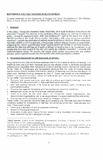Sustainable Self-help Housing In South Africa?
Abstract
In this paper, I explain the theoretical basis of self-help, as a mode of delivery of housing to the
urban poor. I explain the rationale of the multilateral donors' support for self-help in relation to
global, neo-liberal macroeconomics. With that background, I look at the space this mode of
delivery occupies in the South African context, contrasting it with cases of success and failure
elsewhere. I analyse the implication of self-help mode of delivery to the South African urban poor,
exploring whether or not it is desirable .1 then explore self-help through the lens of sustain ability,
suggesting that narrow understanding of the concept hinders its benefits to self-help housing. I
advance the idea that self-help as a mode of delivery of housing has to be homegrown; is not
transferable from one context to the next and cannot be uniformly prescribed. I conclude with
recommendations taking into account the unique South African socio-economic and political
situation, global macroeconomics and the need for more state involvement in welfare.
Publisher
University of Nairobi
Rights
Attribution-NonCommercial-NoDerivs 3.0 United StatesUsage Rights
http://creativecommons.org/licenses/by-nc-nd/3.0/us/Collections
The following license files are associated with this item:


